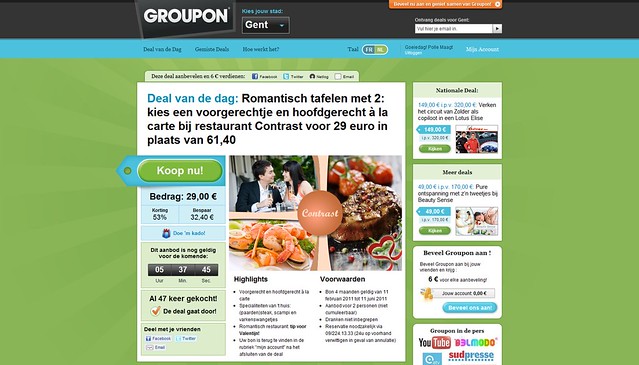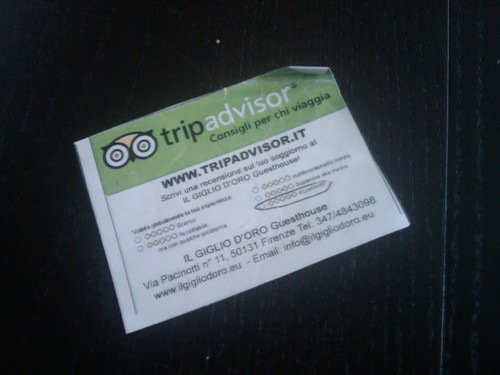
Groupon in Gent
So, what is Groupon?
- Consumers subscribe to discounted product offers via email, facebook or twitter, offered by retailers via the Groupon platform. The discounts range from 50-70%.
- Brands and retailers use the platform to offer coupon discounts on their products and services in a specific geographic location (city, part of a city). They set the discount value and the number of consumers that have to participate with their sales promotion before the sales promotion actually takes place.
- Groupon uses the large discount and the fact that to attract consumers and drive peer to peer recommendations. Groupon gets a decent % of every sales deal that is made. The more consumers and cities, the more possible sales promotions, the more coupons redeemed the more profit.
That means Groupon is a medium for doing targetted sales promotions.
The value in Groupon is that you as a retailer are pretty sure that a consumer is going to redeem his coupon, and thus, that you have acquired a sales (with a discount, that is). Turning this sales into a longer consumer relationship and loyalty is the retailer’s responsability.
That loyalty is the retailer responsibility and has several elements:
- Offering a sales promotion that actually drives brand and conversations and isn’t a mere discount.
- Meeting expectations when consumers redeem the coupon.
- Turning this single sale into a customer relationship.
1) Offering a sales promotion that actually drives brand and conversations
Let’s say you’re the owner of a really expensive restaurant and want to use Groupon. Than you can do two things:
- Do a discount on your normal menu. Your normal 300 euro menu will cost a mere 150 euro. This will attract bargain hunters.
- Do a special Groupon experience menu. Offer a special menu, add an extra bottle of champagne. Normal price would be 450 euro, Groupon deal will be 225 euro. Not only will this be worth talking, the effect of seeing other tables with bottles of champagne will even drive your champagne sales in the restaurant. This will drive conversations and build your brand.
Another example: Let’s say you’re an airliner that has a brand image of being adventurous and you want to promote flying to Kenya. You can either
- Just offer a discounted flight to Kenya. Where you attract bargain hunters.
- Say “We know Kenya and we know you’ll love this. Only once a year there is a really special sunset at a specific mountain in Kenya. Book now and get a discount”. Where you strenghten the perception of you being an adventurous brand and create a story worth sharing.
Don’t use sales promotion as mere sales promotion. Use your sales promotion to drive brand and conversations. Construct your sales promotions in a smart and converting way.
2) Meeting expectations when consumers redeem the coupon
It is tempting to treat Groupon coupon redeemers as second-rank customers, because they pay less and because they might be bargain hunters. To offer them the worst tables, to not take them seriously.
This, however, isn’t what customers expect. They expect to be treated like a normal customer. So do so. Meet expectations. Guillaume van der Stighelen wrote a pretty interesting post about that.
3) Turning this single sale into a customer relationship
 So, the thing is to turn this sales promotion into a customer relationship. By exceeding expectations, by connecting and by giving redeemers reasons to actually plan a repeat visit.
So, the thing is to turn this sales promotion into a customer relationship. By exceeding expectations, by connecting and by giving redeemers reasons to actually plan a repeat visit.
I once was lucky enough to book a discounted Bed & Breakfast in Firenze, Italy. It was just great. The owner Edoardo and his wife showed us around town, helped us when we needed and made us feel very very welcome. When we evantually left, Edoardo asked me if I liked the Bed & Breakfast. I replied I did. Edoardo gave me a small piece of paper asked me “Can you do me a favor, if you like it this much, can you go to tripadvisor.com and write a nice review? That would really really help me.” Edoardo turned a discount into a pleasurable experience and even turned me in an ambassador for his product. THAT is a smart sales promotion.
Final words.
Whenever you do sales promotions, you WILL attract bargain hunters. However, what the % of bargain hunters is and whether they turn into loyal customers is really dependent of your sales promotion. Don’t blame Groupon for being a sales promotion platform, it is the retailer responsibility for offering a sales promotion that drives brand and conversations, that meets expectations and that turns this single sale into a customer relationship.
Gino, what do you think?

1 comment
Polle, I couldn’t agree with you more: sales promotions are what you make of them. Also, never blame Groupon for your own poor conception and follow-up on them. You give some great and smart examples.
However there is a big “but”.
Companies who are sufficiently smart to create a “special discovery Groupon Menu”, premium priced so that the net revenue loss is way less than 50%, should be sufficiently smart to find other and less costly ways to promote themselves.
Groupon is demanding 50% to 70% discounts, usually through a voucher valid over a long period of time. Did your Italian B&B offer such a deep discount? And if so: wasn’t it a last minute offer? Or an off peak time deal?
Think again. The restaurant might auction “a special discovery menu on March 15th” on eBay, ending up with higher sales prices and operational efficiency (all those menus to be served on a single night – your calmest day of the week). They also might want to partner with their champagne supplier to turn it into a food pairing event. The champagne brand could handle the promotion and sponsor part of the discount.
Yes, Groupon addresses a real need of consumers. Yes, some deals will turn out to be profitable for some advertisers. Yes, Groupon will have a successful IPO.
But many consumers will be fed up getting daily e-mails from Groupon promoting restaurants desperate for new customers, because they are simply not good enough to attract them without these huge discounts. And many other companies are already copying Groupon (WalMart, Google, LivingSocial).
By the way: the January Amazon deal on LivingSocial has attracted more buyers than the Gap top offer on Groupon in August. Traffic to LivingSocial increased by 80% while traffic to Groupon dropped by 20% (source: USA Today – http://usat.ly/eQ44Vs )
So if Groupon goes public, you may want to buy shares and ride the hype. But cash in time, because Groupon as a company is likely to be so hyped that it will turn into a bubble. Then again, don’t blame Groupon. Because it wasn’t them but Google who valued them at $6 bio.
Gino (#ginovanossel)